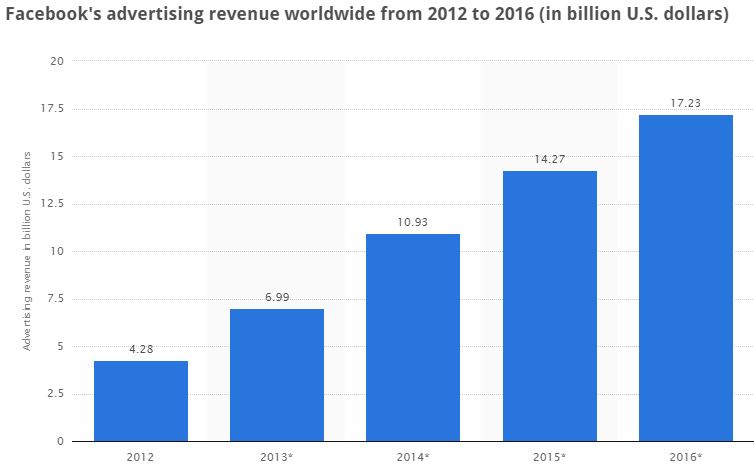
Social media is a necessity for the 21st century. We live in a constantly-connected world and those who choose not to connect are simply left in the dark. But with so many different social media platforms to choose from, only one stands out above the crowd: Facebook.
The Facebook Conundrum
Without a doubt, Facebook is the most popular social network of all time – and they have the numbers to prove it.
- 829 million daily active users on average in June 2014
- 654 million mobile daily active users on average in June 2014
- 1.32 billion monthly active users as of June 30, 2014
- 1.07 billion mobile monthly active users as of June 30, 2014
- Approximately 81.7% of daily active users are outside the US and Canada
To put these numbers in perspective, just consider that the second most popular social network (Google+) combined with the third most popular social network (Twitter) only add up to 795 million monthly active users. This means most people who are using social media are experiencing it the way Mark Zuckerberg intended: by selling advertisers access to your profile.
Facebook generates most of its revenue from advertising and a big part of the company’s pitch to advertisers is their ability to target those ads. Even with a click-through-rate that’s about half the average for display ads across the web, this method has allowed Facebook to become the second largest advertising platform (Google is #1) in the world. And starting today, those ads are going to be a lot more noticeable.
“People spend more time on more devices than ever before. This shift in consumer behavior has had a profound impact on a consumer’s path to purchase, both online and in stores. And today’s technology for ad serving and measurement – cookies – are flawed when used alone. Cookies don’t work on mobile, are becoming less accurate in demographic targeting and can’t easily or accurately measure the customer purchase funnel across browsers and devices or into the offline world. People-based marketing solves these problems.”
– Erik Johnson, Head of Facebook’s Atlas
“People-based marketing” is what Facebook is doing with their new advertising platform, Atlas. Unlike the targeted ads you already see when you login to Facebook; Atlas will allow companies to advertise to you all over the Internet and across all your devices. If successful, Facebook has the potential to revolutionize both the advertising and social media industries.
You may see Facebook as a way to connect with friends and family, but Facebook sees you as data. The company is open about tracking your interests and everything you put on your profile is used to sell advertisements. With Atlas, all this information instantly becomes accessible to any company that wants to buy it.
For example, if a company wanted to target twenty-something’s who were in college and liked to play sports, then Atlas will identify millions of these users. Atlas will also find out which websites these users visit and what devices they prefer. Advertisers would then be able to target their ads on different websites and apps that are guaranteed to be seen by their target audience.
The days of randomly placing ads on the web and hoping people click on them are over.

The Facebook conundrum is whether to sacrifice our privacy for convenience. Most people choose to have a Facebook profile because it’s an easy way to let people know what they’re doing and accept their information is being sold to advertisers. It’s another necessary evil that’s a part of being on social media. But there are a growing number of users who are concerned about their privacy and are doing something about it.
Ello: Hip New Trend or Facebook-Killer?
Rather than quit social media altogether, many people are finding alternatives to Facebook. But instead of joining other popular networks like Google+ and Twitter, they are finding solace in one of the newest (and simplest) networks available today.
Ello is an ad-free social network that accepts users the same way Facebook did in the beginning: By invite only. While the website launched in March of this year, it only began to receive attention earlier this month when Facebook refused to change its real name policy for those who preferred to use a persona name. This caused thousands of people to flock to Ello, turning the small social network into a viral success in the process.
At its peak, 31,000 people were requesting access to Ello every hour. If you haven’t made your request yet, one look at their manifesto may convince you to sign up:
“Your social network is owned by advertisers.
Every post you share, every friend you make and every link you follow is tracked, recorded and converted into data. Advertisers buy your data so they can show you more ads. You are the product that’s bought and sold.
We believe there is a better way. We believe in audacity. We believe in beauty, simplicity and transparency. We believe that the people who make things and the people who use them should be in partnership.
We believe a social network can be a tool for empowerment. Not a tool to deceive, coerce and manipulate — but a place to connect, create and celebrate life.
You are not a product.”
– Ello
Ello collects data about the pages you access and the devices you are using but promises never to sell your information to a third-party. Ello also allows its users to opt-out of analytics and respects “do not track” browser settings. But is this enough to compete with Facebook?
Probably not.
Even with thousands of users abandoning Facebook for Ello, it’s not enough to make a dent in its user base. And with 42.6% of the global online population using Facebook, the launch of Atlas solidifies Facebook as the go-to social network for advertisers. We can only expect that Facebook will use some of their new advertising revenue to make Facebook even better and harder to quit.
Facebook’s worldwide advertising revenue is expected to reach $17.23 billion dollars by the year 2016 – $7 billion more than they will make this year. An ad-free social network like Ello that has no pricing model simply can’t compete with the juggernaut that is Facebook. It also can’t compete because Facebook is not just a social network — it’s also an ad agency. And with companies like Pepsi and Intel already investing money into the Atlas platform, it’s only a matter of time before other brands join in.
Ello prides itself on being the “anti-Facebook” and they will most likely remain just that: an alternative to something many people aren’t willing to give up. Social networks like Google+ and Twitter also tried to compete with Facebook and the results haven’t been so kind. Even with millions of active users every month, the average time spent on Google+ is 7 minutes per month and 44% of Twitter users have never even sent a tweet. Clearly, Facebook is doing something right.
Facebook started the same way Ello did: as a place to connect with friends. Ten years later, it’s one of the most powerful companies in the world. Whether or not Ello follows in Facebook’s footsteps is yet to be seen, but if I had to pick one social network I think will outlast the rest, it would be Facebook.
But I also requested an invite to Ello just in case I’m wrong.
Do you think Facebook will always be the preferred social network? Will Ello be able to compete with Facebook? Which social network do you think will outlast them all? Let us know in the comments below!

